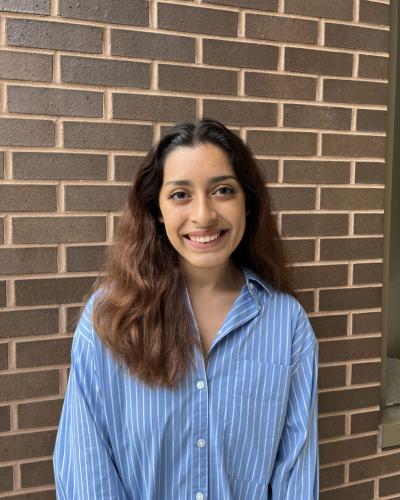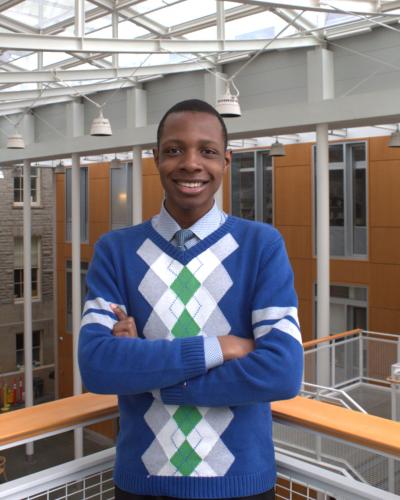Feminist, Gender & Sexuality Studies
and Lesbian, Gay, Bisexual & Transgender Studies
FWS: Topics in Feminist, Gender & Sexuality Studies - FGSS 1100. This course offers students the opportunity to study a wide range of fields from the perspectives of feminist and LGBT critical analysis, in a global context and with the purpose of promoting social justice. Our first-year writing seminars investigate how gender and sexuality are embedded in cultural, social, and political formations. FGSS pays close attention to the complex structures of power and inequality, tracing intersections and relationships among sexuality, race, class, age, ethnicity, and other aspects of identity within their specific contexts of history and geography. Topics vary by section.
Introduction to Feminist, Gender & Sexuality Studies – FGSS 2010. Feminist, Gender & Sexuality Studies is an interdisciplinary program focused on understanding the impact of gender and sexuality on the world around us and on the power hierarchies that structure it. This course provides an overview of key concepts, questions, and debates within feminist studies both locally and globally, focusing mainly on the experiences, historical conditions, and concerns of women as they are shaped by gender and sexuality. We will read a variety of texts--personal narratives, historical documents, and cultural criticism--across a range of disciplines, and will consider how larger structural systems of both privilege and oppression affect individuals' identities, experiences, and options. We will also examine forms of agency and action taken by women in the face of these larger systems.
Television - FGSS 2160 (also PMA 2660). In this introductory course, participants will study the economic and technological history of the television industry, with a particular emphasis on its manifestations in the United States and the United Kingdom; the changing shape of the medium of television over time and in ever-wider global contexts; the social meanings, political stakes, and ideological effects of the medium; and the major methodological tools and critical concepts used in the interpretation of the medium, including Marxist, feminist, queer, and postcolonial approaches. Two to three hours of television viewing per week will be accompanied by short, sometimes dense readings, as well as written exercises.
Queer Pop from the Stonewall Uprising to the Millennium - FGSS/LGBT 2232 (also MUSIC 2232). This course will survey the history and US political contexts of LGBTQ+ identities in popular music over three critical decades. We will cover the 1970s era of gay liberation and visibility with glam rock, first-wave punk, women’s music, and disco; the mainstreaming of queer sensibility in dance pop, new wave, and voguing in the neoliberal 1980s; and 1990s rise of queer theory, AIDS epidemic, “don’t ask don’t tell,” and queer activism reflected in queercore, crypto-queer alternative rock, and coded music videos. We will also consider how these past expressive strategies are referenced and extended in later and current queer pop. No prerequisites
Issues in Contemporary Fiction: Trans Utopias and Genderqueer Science Fiction - FGSS/LGBT 2535 (also ENGL 2535). Dragons? Spaceships? Bodies that change gendered characteristics at will? Vampire archivists? Speculative fiction (sci fi, fantasy) imagines the world not as it is but as it should be. It can imagine worlds where trans, non-binary, and gender nonconforming people thrive without danger or difficulty (and has done so for a long time). What do such worlds look like? How does it feel to read narratives where the gender binary does not work the way it does in our present day? This course surveys very recent trans- and non-binary-authored narratives. Readings may include (Cornell alumna) Ryka Aoki's Light from Uncommon Stars, Isaac Fellman's Dead Collections (the trans vampire archivists), and short stories by authors like Torrey Peters and Daniel Lavery. Visits from authors being planned.
Digital Feminism and Race - FGSS 2723 (also COML 2723). This course raises profound theoretical questions about embodiment, agency, power, and race in virtual spaces. How do digital identities, in their intersection with something called race, interact with physical bodies and material conditions? What are the possibilities and limitations of digital technologies in creating emancipatory futures for raced life? In tackling these questions, the interdisciplinary course explores key dimensions of digital feminism, including activism and advocacy, community building, critique of digital culture, critique of techno-capitalism, call for inclusive design, and artistic and cultural productions.
Islam and Gender - FGSS 2770 (also NES 2770). This course explores the role of gender and sexuality in shaping the lives of Muslims past and present. Through a close examination of ethnographies, intellectual histories, and religious treatises, we will analyze the key debates and discourses surrounding the intersection of gender and Islam. We begin by investigating Quranic revelations and hadith concerning gender and sexual ethics, female figures of emulation in early Islam, and feminist exegeses of the Quran. Continuing onward, we focus upon the everyday lives of Muslim women and non-binary individuals in medieval, colonial, and post-colonial contexts, highlighting the ways in which people negotiate and respond to the sexual politics of the times in which they live as we ask what, if anything, is specifically Islamic about the situations under discussion? Following this, we embark upon a history of sexuality within Islam, tracing the ways in which the categories of homosexuality and heterosexuality came to exist in the Muslim world, as well as the history and positionality of trans communities past and present. We then continue with an exploration of Islamic feminism as it exists today, looking to the ways in which Muslim feminists have critically engaged both religious texts as well as Western feminist theory. Finally, the course concludes by analyzing the relationship between the study of Islam, gender, and empire.
Feminist Theory – FGSS 3000. This course will work across and between the disciplines to consider what it might mean to think 'as a feminist' about many things including, but not limited to 'gender', 'women' and 'sexuality'. We will approach theory as a tool for analyzing relations of power and a means of transforming ways of thinking and living. In particular, we will investigate the cultural, social, and historical assumptions that shape the possibilities and problematics of gender and sexuality. Throughout we will attend to specific histories of class, race, ethnicity, culture, nation, religion and sexuality, with an eye to their particular incitements to and challenges for feminist thinking and politics.
What's in a Sound? Gender and Race in Sound Cultures - FGSS 3316 (MUSIC 3316). What can we hear or see in a sound? Can the sound of a voice conjure traces of a body? How does sound, musical or otherwise, construct gender and race? In this course, we will consider how listening, speaking, and music operate as mechanisms of representation. We will pay particular attention to the work representations do and how they connect to systems of power and identity. From voice-overs and machine listening to reggaeton and Brazilian funk, we will examine the ways sound practices not only mirror gendered, racial, and sexual politics but also produce them. Through several case studies, we will find that the very possibilities of representations are embedded in historical contexts and the variability of media objects.
Virtual Music - FGSS/LGBT 3318 (also MUSIC 3318). This course surveys the histories, aesthetics, and politics of music and virtuality, focusing on contemporary manifestations of “virtual music” since the 2010s. We will learn about how music is created, performed, and consumed in virtual environments, focusing specifically on questions of embodiment and identity. Case studies will include virtual and augmented reality concerts; musical performances in video games; virtual bands; and Web3/blockchain music. We will pay particular attention to the ties between virtual worlds, musical aesthetics, and queer and trans community building. Students will learn how to conduct digital musical ethnography and will complete participant observation-based final projects in a virtual music community.
Every Body: Theories of the Body from the Sixteenth Century to the Present - FGSS 3545 (also FREN 3545). Discussions surrounding controversies about gender often exclude intersex, perpetuating the assumption that nonbinary gender is not “natural.” We will examine the social and political stakes of including intersex in our thinking about gender, guided by the work of Hil Malatino, David Rubin, Iain Morland, and others, as well as by early modern theories of intersex and transgender elaborated by Ambroise Paré, Michel de Montaigne, and Jacques Duval, who recognized intersex as a natural variation. Intersex theory will be linked to George Canguilhem’s critique of the concepts of normal and abnormal and contrasted with John Money’s problematic theories of gender.
Comics as a Medium - FGSS/LGBT 3555 (also GERST 3555). What are comics? While it's easy to identify a cartoon, graphic novel, or comic book, it's hard to understand the wide world of comics. As a medium, comics are part of a global tradition of visual storytelling and sequential art, including premodern tapestries, early modern pamphlets, and modern children's books, political cartoons, and animated films. With a focus on the German-speaking world, we will examine a wide range of comics genres (e.g., fiction, history, autobiography, journalism, comix) and formats (e.g., books, strips, pamphlets, zines). Our discussions will address questions of taste, aesthetics, materiality, censorship, representation, and word-image relations. While we will primarily be reading and writing about comics and comics studies, students will also gain some exposure to making comics.
Queer Classics – FGSS 3636 (also CLASS/LGBT/SHUM 3635). This course engages classical antiquity and its reception through the prism of queer studies. Cruising Homer, Sappho, Euripides, Plato, Ovid and more, we will explore how queer theoretical frameworks help us account for premodern queer and trans bodies, desires, experiences, and aesthetics. We will trace how people historically have engaged with the classical past in political and affective projects of writing queer history and literature, constructing identities and communities, and imagining queer futures. We will unpack how classical scholarship might reproduce contemporary forms of homophobia and transphobia in its treatments of gender, sexuality, and embodiment in the classical past, and in turn how modern uses of the classical might reinforce or dismantle exclusionary narratives around 'queerness' today as it intersects with race, gender, sexuality, and class. Finally, we will consider how the work we are doing in this class (where the 'Queer' in 'Queer Classics' may be taken as an adjective or an imperative) relates to the ways that contemporary writers, activists, artists, and performers have animated the classical past with queer possibilities. All readings will be in translation; no knowledge of Latin and Greek is required.
Gender, Sexuality, and the U.S. in the World - FGSS 4265 (HIST 4265). The field of gender history is one of the most dynamic taught across universities today. No longer simply the history of women, gender history now includes the history of men and masculinities, queer studies and theory, the history of sex and sexuality, and trans studies. Historians writing about gender and sexuality have been at the forefront of some of the most important recent interventions in U.S. history, from the transnational, cultural, and postmodern turns, to the histories of language, labour, and capitalism. Against the backdrop of the #MeToo Movement, gender history has been imbued with renewed vigour, as scholars seek to understand what new insights in our present moment might reveal about the past. In this seminar, we will explore the intertwined histories of sex, sexuality, and gender at the intersection of other major themes in American history: race, labour, empire, and the state. What does U.S. history look like if we place bodies at the centre of our narratives? How has the legacy of sexual violence in plantation slavery underwritten the systems – such as private property, white supremacy, and carcerality -- that structure modern American society? To what extent has the United States’ foreign policy been motivated by what the scholar Gayatri Spivak described as the desire of white men to save brown women from brown men? Uncovering the pasts of the most marginalised historical actors – enslaved women, rape victims, trans and queer people – requires innovative methodologies and new relationships to the archive. In this seminar, then, we will also think about how we do gender history, and develop tools for reading and researching that take us beyond the boundaries of the written record and into the realm of the speculative, the spectral, and the imaginary.
Sociology of Sex and Gender – FGSS 4371 (also SOC 4370). This course provides an introduction to the theoretical and empirical literature on the sociology of sex and gender. The readings cover theory and methods, feminism, masculinity, intersectionality, international/comparative perspectives, gender roles, and recent sociological research in this area.
Girls, Women, and Education in Global Perspective: Feminist Ethnography and Praxis - FGSS 4458 (also ANTHR 4458). This seminar explores and compares the educational and schooling experiences of young women and girls through an array of ethnographic studies conducted in different regions of the world. Drawing on the fields of anthropology of education and feminist studies, we examine how girls and young women construct gender identities and ways of knowing through prisms of race, ethnicity, sexuality, class, language, nation and citizenship. Second, we inquire into how gendered notions of development and state sanctioned forms of structural and symbolic violence, impact young women's educational experiences and opportunities, and how they in turn respond. Lastly, we consider young women as learners who craft their own lives and literacies across borders and diverse spaces of home, school, community, and peer group.
Women and the Economy - FGSS 4460 (also ILRLE 4450). Examines the changing economic roles of women and men in the labor market and in the family. Topics include a historical overview of changing gender roles, the determinants of the gender division of labor in the family, trends in female and male labor-force participation, gender differences in occupations and earnings, the consequences of women’s employment for the family, and a consideration of women’s status in other countries.
How to Make Queer Kin: Sustaining Bonds in LGBTQ Culture - FGSS/LGBT 4705 (also SHUM 4705). How do queer people make family? What cultural and artistic practices sustain queer bonds? To answer these questions, this course examines queer and trans kinship narratives across a range of genres, including literature, film, television, and critical theory. We will theorize kinship's relationship to cis-heteronormativity, capitalism, white supremacy, and colonialism, and debate whether queer and trans kinships can model new political forms.
Reading (with) Judith Butler - FGSS 4815 (also COML 4815). Judith Butler is one of today’s foremost theorist and cultural critic. Even though they are known, above all, for their work in gender studies and queer theory, their theoretical thought ranges widely. It also draws on a wide range of theoretical traditions, literary and filmic works, and political events. In this course, we will read widely from Butler’s work (from Gender Trouble to Who’s Afraid of Gender), as well as reading some of the key texts that Butler draws on. We will develop a critical understanding of Butler’s strategies for reading and writing to hone our own critical and theoretical skills.
Performance Studies: Theories and Methods – FGSS/LGBT 4835 (also PMA 4835). Charting the advent and defining principles of performance studies, this course explores the interdisciplinary history of the field, including its association with anthropology, visual studies, theater, gender studies, sociology, psychology, literature, philosophy, and critical race studies. This class examines performance as a means of creative expression, a mode of critical inquiry, and an avenue for public engagement. We will attend to both the practice of performance - as gesture, behavior, habit, event, artistic expression, and social drama - and the study of performance - through ethnographic observation, spectatorship, documentation, reproduction, analysis, and writing strategies. Through a study of research paradigms and key issues related to performance, we will explore not only what this highly contested term "is" and "does," but when and how, for whom, and under what circumstances.
Graduate Level Classes:
Environmental Bodies in STS - FGSS 6211 (also STS 6211). Given the porosity of bodies, where does the environment begin or end? How are the bodies we call environmental more than resources for extraction and exploitation? How might they be sources of enchantment, wonder, pain, or other forms of knowledge? This class engages current ethnographies and histories of how environmental knowledges are differently experienced and embodied.
Gender, Sexuality, and the U.S. in the World - FGSS 6265 (also HIST 6265). The field of gender history is one of the most dynamic taught across universities today. No longer simply the history of women, gender history now includes the history of men and masculinities, queer studies and theory, the history of sex and sexuality, and trans studies. Historians writing about gender and sexuality have been at the forefront of some of the most important recent interventions in U.S. history, from the transnational, cultural, and postmodern turns, to the histories of language, labour, and capitalism. Against the backdrop of the #MeToo Movement, gender history has been imbued with renewed vigour, as scholars seek to understand what new insights in our present moment might reveal about the past. In this seminar, we will explore the intertwined histories of sex, sexuality, and gender at the intersection of other major themes in American history: race, labour, empire, and the state. What does U.S. history look like if we place bodies at the centre of our narratives? How has the legacy of sexual violence in plantation slavery underwritten the systems – such as private property, white supremacy, and carcerality -- that structure modern American society? To what extent has the United States’ foreign policy been motivated by what the scholar Gayatri Spivak described as the desire of white men to save brown women from brown men? Uncovering the pasts of the most marginalised historical actors – enslaved women, rape victims, trans and queer people – requires innovative methodologies and new relationships to the archive. In this seminar, then, we will also think about how we do gender history, and develop tools for reading and researching that take us beyond the boundaries of the written record and into the realm of the speculative, the spectral, and the imaginary.
Sociology of Sex and Gender - FGSS 6371 (also SOCI 6370). This course provides an introduction to the theoretical and empirical literature on the sociology of sex and gender. The readings cover theory and methods, feminism, masculinity, intersectionality, international/comparative perspectives, gender roles, and recent sociological research in this area.
Feminist Pedagogy: What, Why, and How - FGSS 6441 (also ENGL 6440). This seminar will explore the both the intellectual grounding of and the nuts and bolts of feminist pedagogy. In what context did feminist pedagogy emerge and why? How have its practitioners variously defined it? What goals in teaching have they pursued? How might this work be useful to you as a teacher beginning or honing your teaching? Both theoretical and practical questions like these will be our subject.
How to Make Queer Kin: Sustaining Bonds in LGBTQ Culture - FGSS/LGBT 6705 (also SHUM 6705). How do queer people make family? What cultural and artistic practices sustain queer bonds? To answer these questions, this course examines queer and trans kinship narratives across a range of genres, including literature, film, television, and critical theory. We will theorize kinship's relationship to cis-heteronormativity, capitalism, white supremacy, and colonialism, and debate whether queer and trans kinships can model new political forms.
Reading (with) Judith Butler - FGSS 6815 (also COML 6815). Judith Butler is one of today’s foremost theorist and cultural critic. Even though they are known, above all, for their work in gender studies and queer theory, their theoretical thought ranges widely. It also draws on a wide range of theoretical traditions, literary and filmic works, and political events. In this course, we will read widely from Butler’s work (from Gender Trouble to Who’s Afraid of Gender), as well as reading some of the key texts that Butler draws on. We will develop a critical understanding of Butler’s strategies for reading and writing to hone our own critical and theoretical skills.
Performance Studies: Theories and Methods - FGSS 6835 (also PMA 6835). Charting the advent and defining principles of performance studies, this course explores the interdisciplinary history of the field, including its association with anthropology, visual studies, theater, gender studies, sociology, psychology, literature, philosophy, and critical race studies. This class examines performance as a means of creative expression, a mode of critical inquiry, and an avenue for public engagement. We will attend to both the practice of performance - as gesture, behavior, habit, event, artistic expression, and social drama - and the study of performance - through ethnographic observation, spectatorship, documentation, reproduction, analysis, and writing strategies. Through a study of research paradigms and key issues related to performance, we will explore not only what this highly contested term "is" and "does," but when and how, for whom, and under what circumstances.
Girls, Women, and Education in Global Perspective: Feminist Ethnography and Praxis - FGSS 7458 (also ANTHR 7458). This course explores the rich and diverse history of women’s participation in the motion picture industry. Focusing on women directors within a global context from the silent era to the present, this class considers the historical, cultural, and industrial factors that shape their films’ production, distribution, and exhibition. Students will consider the political, aesthetic, stylistic, and formal qualities of films directed by women while placing them within national, cultural, institutional, and economic contexts. By watching, analyzing, and reading about films directed by women, students will gain a deeper knowledge of film history, feminist film culture, and feminist theory and criticism.





